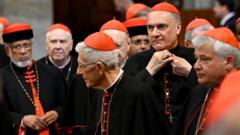Despite significant geopolitical tensions and budgetary cuts in major economies, delegates at UN biodiversity talks in Rome have reached a preliminary agreement aimed at improving global biodiversity funding and protection measures.
Progress Made at UN Biodiversity Talks Amidst Global Challenges

Progress Made at UN Biodiversity Talks Amidst Global Challenges
Delegates in Rome announce agreements to monitor commitments for ecological conservation despite geopolitical strains.
In a bid to counter the ongoing biodiversity crisis, delegates at U.N. biodiversity talks in Rome made significant strides on Thursday, proposing a framework intended to enhance oversight of environmental commitments. This meeting is part of ongoing discussions following a global biodiversity summit that took place a year prior in Cali, Colombia.
The urgency of these talks comes as unprecedented biodiversity losses are being experienced worldwide, primarily due to human-induced changes to ecosystems. Amid recent geopolitical upheavals, representatives from various countries congregated in a large conference space, engaging in intricate negotiations for incremental yet crucial agreements.
“Together, we are shining a beacon of hope,” stated Susana Muhamad, Colombia’s outgoing environment minister and chair of the assembly. “It illustrates that collective action — beyond individual national interests — is achievable when focused on the common good of our planet.”
The discussions highlighted the financial disparities faced by many countries rich in biological diversity but lacking economic resources. A significant bone of contention during the three-day negotiations was the proposal for a new fund to facilitate part of a broader strategy aimed at mobilizing $200 billion annually for biodiversity initiatives by the year 2030.
Delegates from African and Latin American nations championed the establishment of a new financial mechanism, arguing that existing processes for accessing multilateral funds are inefficient and inequitable. Conversely, representatives from donor nations expressed concerns regarding the establishment and operational costs of such a fund, fearing it could divert resources away from vital conservation efforts.
Ultimately, after intense negotiations, delegates achieved a consensus on launching a process to further assess the potential creation of this new fund. The announcement prompted a round of applause in recognition of the progress made—albeit a challenging compromise amidst a backdrop of geopolitical and economic uncertainty.





















